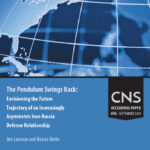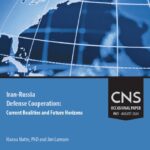 Senior Research Associate
Senior Research Associate
[email protected]
Maine, USA
703.859.6540
Areas of Research
- Iran’s intentions, activities, and capabilities in precision strike weapons, missiles, weapons of mass destruction (WMD), and space
- Iran’s defense industries
- Iran’s military strategy and its threat and use of military force
- Iran’s policies and positions on nonproliferation, arms control, disarmament, and regional security, including transparency and confidence-building measures (TCBMs)
- Role and limits of intelligence in nonproliferation and arms control
- Open-source research and analysis
Background
Jim Lamson is a Senior Research Associate based in Maine, and is a Visiting Research Fellow (non-resident) with the Department of War Studies at King’s College London. His research focuses on Iranian weapons, space, and military issues, and Iran’s security and arms control policies. Prior to joining CNS, Jim worked for 23 years as an analyst with the Central Intelligence Agency, focusing on Iranian weapons and military issues, and served for more than five years in the Middle East. Before that, he worked on nonproliferation issues at CNS, the Conference on Disarmament, International Atomic Energy Agency, and U.S. Department of State.
Education
- BA in East Asian Studies, Middlebury College
- MA in International Policy Studies, Monterey Institute of International Studies
- MS in National Resource Strategy, National Defense University, with a certificate in Supply Chain Management
CNS Work
- OP66:The Pendulum Swings Back: Envisioning the Future Trajectory of an Increasingly Asymmetric Iran-Russia Defense Relationship
 With Russia’s full-scale invasion of Ukraine in February 2022, Iran emerged as an important provider of defense technology to Russia.
With Russia’s full-scale invasion of Ukraine in February 2022, Iran emerged as an important provider of defense technology to Russia. - OP#61: Iran-Russia Defense Cooperation: Current Realities and Future Horizons
 Since Russia’s full-scale invasion of Ukraine in February 2022, the country’s defense relationship with Iran has deepened and widened considerably.
Since Russia’s full-scale invasion of Ukraine in February 2022, the country’s defense relationship with Iran has deepened and widened considerably. - The Uncomfortable Reality of Russia and Iran’s New Defense Relationship
 Since 2022, Russia’s defense relationship with Iran has taken a big leap forward.
Since 2022, Russia’s defense relationship with Iran has taken a big leap forward. - Strategic Empathy: Examining Pattern Breaks to Better Understand Adversaries
 Through case studies involving Russia, North Korea, and Iran the authors suggest that a more holistic, nuanced understanding of the adversary can inform effective policy responses.
Through case studies involving Russia, North Korea, and Iran the authors suggest that a more holistic, nuanced understanding of the adversary can inform effective policy responses.
